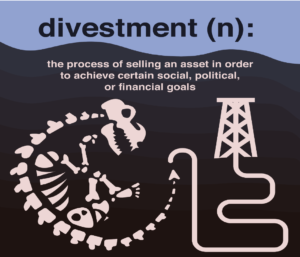Since its announcement at the end of winter term last year, the Divestment Committee has gone off the public radar at Choate. The team took a short break in the fall from their work in pushing the school towards divestment from the fossil fuel industry to accommodate the busy schedules of the students and faculty involved. According to Lizzy Mitchell ’19, a core member of the Divestment Team, “Even though we took a little break in the fall, we have a fairly concrete plan of what we hope to accomplish this year.”
The committee is structured to work directly with the Board of Trustees, which is responsible for managing the school’s endowment. Due to the busy schedules of many members on the Board of Trustees, there are lengthy breaks between each meeting, which allow for the student members of the committee, alongside faculty advisers Ms. Ashley Bairos and Dr. Christopher Hogue, to focus on preparing new proposals.
Recently, the relationship between the committee and the Board has changed. Mitchell said, “The Divestment Task Force is now very separate from the Board. This is because we achieved what we wanted to last year. Ultimately, the divestment subcommittee of the Board, which Noah and I sat on last year, has been very much put on hold after the whole Board gave us their decision last year.” The Board decided in their proposal (decision) that, commencing July 1, 2020, it would make concerted efforts to avoid making commitments and investments with funds and partnerships that predict greater than 50 percent of their investment activity in fossil fuels.
Divestment looks to be a lengthy process, as Choate does not directly purchase stocks from fossil fuel companies. Instead, the School’s endowment is handed to a group of over thirty financial investors appointed and vetted by the Investment Committee. The financial investors then invest their share of the endowment into mutual funds, private equities, and other stocks. Many of the mutual funds that these financial investors invest in hold stocks in fossil fuel companies.
Furthermore, many of the financial investors require long-term commitments from the School, with each investment lasting around ten to fifteen years. Therefore, if Choate follows through with divestment, it would require a lengthy proposal process that encourages these financial investors to slowly phase out their investments from fossil fuels. In addition, a crucial part of the decision depends on whether or not the financial investors can stay profitable after the divestment process.
The Committee was created in 2016 when Chris Moeckel ’16 discovered that over 10% of Choate’s $371 million endowment was invested in companies with close ties or direct connections to fossil fuels. Moeckel wanted to address the $37 million invested in fossil fuels and began holding conversations with students and faculty on campus. Afterwards, Moeckel and a group of ten fellow seniors created a 20-point plan, which coordinated meetings with different administrators, drafted a petition plan, and organized a protest against the school administration. Not every step of the plan was completed, however: the protest was called off, thanks to Dr. Curtis. On the other hand, the petition was a huge success, collecting upwards of 400 signatures on the first night.
Now, in 2019, Mitchell believes that the student body should continue to be involved with the issue: “In the future, we need to continue to educate the campus on the subject of divestment, and why it is a useful tool. Also, we need to keep the campus engaged with respect to divestment, so we can ensure that the Board goes through with their proposal. After that agreement is over, I would love to see students push further and demand more action from our Investment Committee.”
The future of the Divestment Committee will be reviewed in the spring. Mitchell stated, “I think that, as far as our work with the Trustees, we are probably a couple more years from sitting down with them again. We are working on a personal divestment project, which would apply to everyone on campus.” A recruitment process for this initiative will surface in the spring, as Mitchell expressed, “I don’t think we can finish the project we want to with just the time left this year.”





